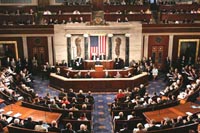U.S. Congress helps Serbia to put brake on Kosovo's independence
Serbia is urging the U.S. House of Representatives to follow the Senate's lead and say that the breakaway province of Kosovo is not now ready for independence. Vuk Jeremic, Serbian President Boris Tadic's chief foreign affairs adviser, is in Washington this week meeting with House leaders and staff, urging them to endorse a Senate resolution passed seven months ago that condemned violence against ethnic Serbs in Kosovo and demanded stronger democratic institutions in the province.

Although a part of Serbia , Kosovo borders Albania and has a majority ethnic Albanian population. In recent weeks, European leaders, such as British Foreign Secretary Jack Straw, have blessed the eventual independence of Kosovo. "Thank God nobody in the U.S. is saying that publicly," Jeremic said in an interview with The Associated Press.
From within the U.S. foreign policy establishment, the nearest to that was a comment this week by Undersecretary of State Nicholas Burns. In discussing the Balkan countries' future in Europe , Burns listed Serbia , Croatia , Albania , Macedonia "and an independent Kosovo, if it is to be created by the United Nations sometime this year, and that seems to be the object of this negotiation." Moving that quickly, Jeremic said, would be a problem for Serbia , the linchpin of the former Yugoslavia .
"If there is an independent Kosovo right now or in the near future, Serbia will not be able to accept it," Jeremic said, "for the simple reason that whoever does it in Serbia will never ever be able to pull a significant number of votes in a Serbian democracy." Serbian Prime Minister Vojislav Kostunica this week suggested instead "a compromise that ensures autonomy for Kosovo that is in accordance with European" standards.
Kosovo has been a U.N.-run protectorate since 1999, when NATO bombing stopped the Serbs' crackdown on ethnic Albanian separatists. Kosovo's population is about 90 percent ethnic Albanian. They have rejected such offers of broad autonomy and demand outright independence.
The U.S. State Department is part of a six-nation group urging a resolution to Kosovo's status this year. But Jeremic said Congress could provide important political cover for Serbia 's centrist coalition leadership if it would emphasize Kosovo's failures to meet the requirements for independence.
"If there are certain progressive forces, pro-European and pro-Euratlantic forces in Serbia , you do not ask them to commit suicide by asking them to accept what is simply against the deep gut feeling of the Serbian people," said Jeremic. He fears an opening for the opposition Radicals, successors to the late President Slobodan Milosevic's Socialists and the largest party in the Serbian Parliament.
There are rumblings on Capitol Hill that the Serbs are not constructive participants in the Kosovo talks. Kosovo's Serbs have boycotted local institutions since ethnic violence erupted March 17, 2004 . Martti Ahtisaari, the U.N. envoy mediating the talks, wants Belgrade to give Kosovo's Serbs the green light to get involved. "It takes two to tango," said Hua Jiang, Ahtisaari's spokeswoman in Vienna .
Jeremic said Serbs put more stock in Congress' views than in State Department policies. Serbs feel Congress set an enduring anti-Serbian tone when it denounced Milosevic's crackdown on Kosovo's ethnic Albanians in 1998, ahead of the U.S.-led NATO intervention in Kosovo the following year, Jeremic said. But he said Serbs still look to America to set the tone and rejoiced last fall when the Senate, led by Sen. George Voinovich of Ohio , who is of Serbian and Slovenian descent, passed its resolution.
A similar statement was offered in the House by Rep. Steve Chabot, like Voinovich an Ohio Republican, who said he can move it through the International Relations Committee to a final vote soon.
"Without preordaining where they'll end up, it's important to say the parties must sit down and negotiate and work this out," Chabot said. "This current status will break down at some point. And I'm afraid you'll have radicals on various sides deciding on the ground what will happen, and that will mean a lot of people caught in the crossfire." One of the biggest sticking points for Serbs is Kosovska Mitrovica, a region of northern Kosovo populated almost entirely by ethnic Serbs. Ahtisaari and the international overseers say Kosovo's status should be determined by its people. Jeremic said if self-determination is good enough for Kosovo, it should be for Kosovska Mitrovica, too. Jiang said there will be no partition of Kosovo. A last round of negotiations starts May 4 in Vienna , Austria , and will deal with the possibility of drawing borders for municipalities, including Kosovska Mitrovica, she said, reports the AP.
N.U.
Subscribe to Pravda.Ru Telegram channel, Facebook, RSS!





